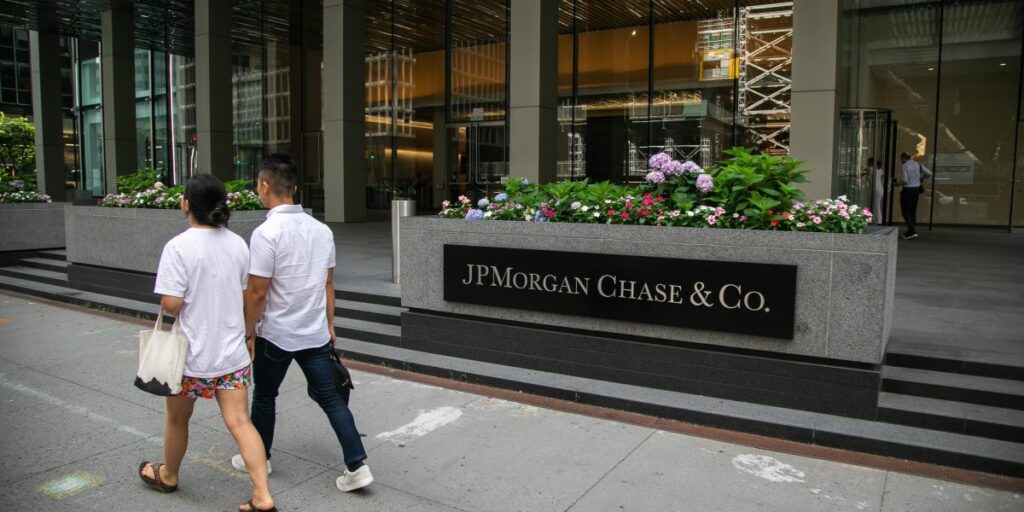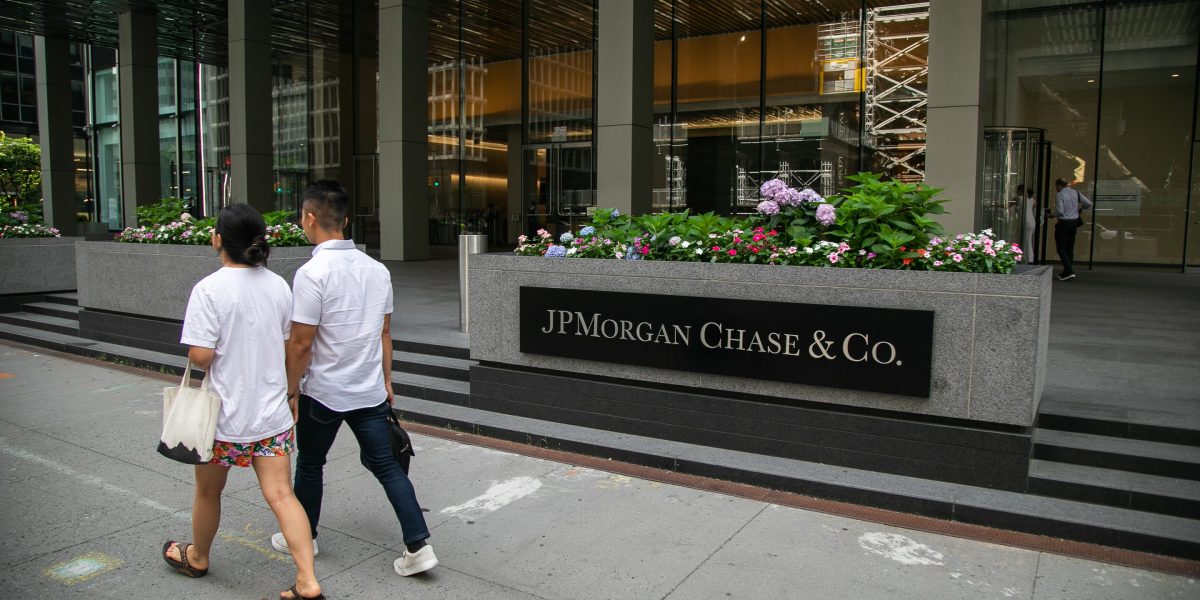JPMorgan client who lost $50 million fortune amid dementia is denied trial
A federal judge in Boston threw out a lawsuit filed by Peter Doelger, 87, and his wife, Yoon, accusing the firm of keeping him in an inappropriate investment.


A once-wealthy JPMorgan Chase & Co. client whose portfolio crumbled as he slid into dementia lost a legal battle seeking to recoup his fortune from the bank.
A federal judge in Boston threw out a lawsuit filed by Peter Doelger, 87, and his wife, Yoon, accusing the firm of keeping him in an inappropriate investment. In a ruling unsealed Friday, the judge said it doesn’t appear JPMorgan knew about Peter’s deteriorating cognition over the years in which he lost a fortune the firm had pegged at more than $50 million.
While the ruling blocks their complaint from going to trial, the couple still faces a countersuit from JPMorgan seeking to recoup its costs from the three-year legal fight. A family attorney said they are interested in appealing the judge’s decision.
The rise and fall of the Doelger family fortune, chronicled by Bloomberg in December, tested whether Wall Street firms can be held responsible for losses by clients whose ability to understand their portfolios wanes. Financial firms screen customers to ensure they’re sophisticated enough to make complex investments — but the industry’s practices for monitoring their cognition as they age are less regimented.
It’s a growing issue as American retirees live longer atop a record stockpile of wealth.
In the Doelgers’ case, JPMorgan helped Peter invest the lion’s share of his portfolio money in oil and gas partnerships — to a degree that far exceeded the firm’s internal guidelines. Though Peter attested to his expertise in such assets, Yoon said her husband lost his ability to understand them and increasingly relied on the firm’s advice. The investments erased their fortune in half a decade.
US District Judge Angel Kelley in Boston found the Doelgers failed to show JPMorgan breached its duties — setting high bars for claiming a firm took advantage of a client’s deteriorating cognition.
The judge said that the Doelgers, their family and other representatives didn’t notify JPMorgan that Peter had been diagnosed with a mental health condition. Yoon’s testimony that she told their main contact at the bank that her husband was having memory problems wasn’t enough to trigger the lender’s internal policies meant to protect elderly clients, the ruling found.
“Ultimately, this is central point to this action — whether there was reason for the defendants to know that Peter was suffering mental and cognitive decline, sufficient to render him unable to make the financial decision that he did,” Kelley wrote. “As unfortunate as it is, the court finds there is no evidence in the record to support plaintiffs’ claim.”
An attorney for the Doelgers said they feel strongly that justice has not been served.
“We believe the court erred in its decision denying our elderly clients an opportunity to be heard at trial while simultaneously allowing JPMorgan’s counterclaims for legal fees,” said the lawyer, James Serritella, who is also the couple’s son-in-law. “Meanwhile, JPMorgan has continued the posture they started with, using their immense resources to fight an elderly couple whose life savings was wiped out, by threatening to make Yoon and Peter, and even me, their attorney, pay JPMorgan’s legal fees.”
The bank praised the ruling.
“In Judge Kelley’s carefully written memorandum and order, Judge Kelley remarked throughout that plaintiffs had mischaracterized the record and made assertions that were misleading, unsupported and untrue against JPMorgan and its employees,” a company spokesperson said in a statement.
Spotting Dementia
The case underscores how hard it can be to determine after losses whether a customer’s cognition had declined, and whether a firm should have noticed.
Thanks to years of rising markets, more Americans are wealthy enough to be deemed “accredited” or “sophisticated” under US financial rules – permitting firms to offer them more complex, and potentially riskier, investments. The industry lacks a formal system for detecting when clients can no longer manage their own finances, leaving it up to individual firms to establish internal policies.
At JPMorgan, employees are required to immediately report to a supervisor “any situation where they have a reasonable basis to believe that diminished capacity and/or the potential financial abuse, exploitation or neglect of an elder or vulnerable client has occurred,” according to documents filed in the Doelgers’ case.
Signs of diminished capacity, according to JPMorgan’s policy, include memory loss, disorientation, difficulty performing simple tasks, poor judgment, unusual mood swings and difficulty with abstract thinking.
In her testimony, Yoon described episodes of Peter becoming confused during calls with the firm. And an expert witness for the Doelgers wrote in a report to the court that by the latter half of 2019 her husband’s declining mental condition would have been apparent to people at the bank.
Kelley said internal JPMorgan messages from the Doelgers’ main contact, James Baker, complaining about Peter’s long-winded and repetitive conversations were not evidence that Peter’s mental health issues were known or suspected by the bank. Baker told the court that he didn’t know about Peter’s declining mental health until the family moved to sue JPMorgan.
“None of the emails plaintiffs rely on suggest JPMC knew or even believed Peter was behaving erratically or irrationally, or that he was demonstrating memory loss,” Kelley wrote.
Medical Experts
Kelley also rejected claims that Peter was diagnosed with rapidly progressive dementia as early as 2014. In her ruling, she quoted JPMorgan’s medical expert who reviewed two scans of Peter’s brain in 2014 and concluded they weren’t abnormal for someone his age, though could be consistent with dementia, if symptoms were present. She said the Doelgers’ conclusion was based on the 2014 scans as well as one from 2020, but that the family’s expert didn’t give a time frame for when he believed dementia was first present.
The ruling doesn’t address medical records filed in the case from an emergency room visit in 2015, stemming from Peter calling 911 from his car to report that he was being followed. The doctor who examined Peter diagnosed him with “paranoid ideation; cognitive deficits; dementia.” A physician’s assistant who examined Peter noted that he couldn’t recall three words — “red, cup, floor” — after three minutes.
At the time, Peter was in the process of setting up investments with JPMorgan. The family’s fortune was gone by mid-2020.
A magistrate judge who previously reviewed the case noted that Yoon and the family’s lawyers certified to the court that Peter reviewed and understood the lawsuit before filing it in 2021. A court-ordered exam later declared him unable to testify in the litigation, and both sides agreed not to contest it.
‘Big Boy Letter’
Kelley’s 44-page opinion adopts the magistrate’s earlier finding that the Doelgers couldn’t show that there were significant facts in dispute that would warrant a trial.
One dispute involved the Doelgers’ wealth at the time JPMorgan prepared to handle their portfolio. In 2015, JPMorgan documents listed the family’s net worth at $100 million, when it was actually closer to $50 million, or potentially less.
The bulk of the Doelgers’ portfolio was made up of master limited partnerships — investments tied to oil and gas contracts. Under JPMorgan’s suitability guidelines, such securities should be limited to just 5% of a client’s assets.
In 2015, Peter had more than $30 million invested in MLPs. That raised concerns inside JPMorgan, which required him to sign a “Big Boy letter” attesting to his understanding of such complex products and noting that he had been encouraged to diversify his portfolio.
By signing, he agreed that he was knowledgeable about MLPs, understood the risks of concentrated investments and had been warned by JPMorgan to diversify. The letter also said he wouldn’t hold the firm liable for any losses. JPMorgan has claimed in court that a copy of the letter was sent to a lawyer for Peter at the time.
The Doelgers allege that someone at JPMorgan knowingly overstated Peter’s wealth in order to get the bank to approve the concentration of bets on MLPs – such as by swapping out pages from an account application after Peter signed it.
Inconsistencies in JPMorgan’s records pertaining to Peter’s assets were not proof of malfeasance by bank employees, Kelley ruled.
Ultimately, she found, Peter was best-positioned to know the value of his assets and confirmed those amounts by signing the Big Boy letter.





